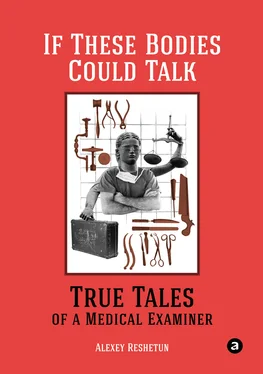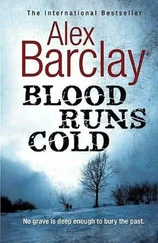And, while it is true that sometimes our personal lives leave something to be desired, are medical examiners the only people who deal with this sort of problem?
3. PATHOLOGIST OR MEDICAL EXAMINER? WHAT IS SIMILAR, WHAT IS NOT
People, and sometimes even doctors, often use the terms "medical examiner" and "pathologist" interchangeably. If our colleagues have trouble telling us apart, how can we expect laypeople to manage this? At first glance, pathologists and medical examiners appear to be in the same line of work – but the differences between them are quite significant.
But first – the similarities. Both pathologists and medical examiners are doctors. They have both completed medical school before deciding to specialize in either pathology or forensic medicine. They both wear white coats, both work in a morgue, and they both examine dead bodies.
But that is where the similarities end. Pathologists work in a hospital and examine bodies at the request of the chief physician, who is their boss. Arthur Hailey did an excellent job capturing the relationship between pathologists and hospital staff in his book, The Final Diagnosis . Generally speaking, pathologists monitor treatments and diagnoses by examining the bodies of people who died in the hospital or of disease. For example, let us imagine someone who has a heart attack, known as an acute myocardial infarction . He is brought to the hospital in an ambulance, receives a diagnosis, and the doctors begin treating him. But sometimes, despite our most valiant efforts, people die. This is where the pathologist comes in to perform a postmortem exam to determine whether the doctors' diagnosis and course of treatment were correct. The pathologist will look at the histology of a dead body or examine biopsies from someone who is still alive. When performing an autopsy, he or she may choose not to examine the person's skull if there is no reason to do so.
Of course, pathologists do examine people who died at home, but only when they did so in front of witnesses (especially doctors), suffered from a long, chronic illness (confirmed by medical records), and the body did not present any sign of injury. In Russia, the number of people who die at home and are later examined by a pathologist varies among the regions – sometimes it is as high as eighty percent, and sometimes as low as ten percent.
The two most important words when describing the work of a pathologist are "disease" and "hospital." Pathologists do not examine people who died a violent death. If during a postmortem examination a pathologist sees signs of violent death, he or she must: (1) immediately stop the autopsy; and (2) contact law enforcement agencies to send the body to a medical examiner.
It is necessary to distinguish what exactly constitutes a "violent death." Most people assume that if someone is not found with an axe sticking out of their head, their death was not violent. In fact, things are not that simple. Any death that occurs due to factors in someone's external environment – cold temperatures, alcohol, carbon monoxide, or, yes, an axe wound – is considered violent. Intent does not matter here – if someone died from alcohol poisoning, whether he drank too much of his own free will, if someone poured vodka down his throat, or he drank it by accident is of little importance. In any case, the death will be considered violent.
In fact, only three types of death are considered non- violent: (1) death from disease (for example, our heart attack patient above, or someone who dies of pneumonia, a stroke, etc.); (2) death from old age (medical examiners will only see one of these cases every couple of years); and (3) death as the result of a stillbirth caused by congenital anomalies.
In short, pathologists do not examine violent deaths. That is the job of a medical examiner.
Medical examiners do not work in a hospital but in a specialized institution – in Russia's case, the Moscow Forensic-Medical Bureau. Though their offices may happen to be located in a hospital, they do not answer to the chief physician, and only examine bodies when directed to do so by law enforcement agencies. There, they handle all violent deaths (murder, suicide, accidental); sudden or unexpected deaths; deaths with no witnesses or with undetermined causes; unidentified bodies; almost all deaths involving children; and so-called "medical cases." The most important word that characterizes a medical examiner's work is "independence."
That independence is enshrined in the federal laws of the Russian Federation and numerous departmental regulations. Medical examiners do not answer to investigative authorities, the prosecution, or the defense, and they issue their conclusions based solely on their examination.
Each medical examiner must be criminally liable (!) for his or her conclusions – Article 307 of the Russian Criminal Code ensures this, and I hope that will remain the case. It is not the case for pathologists, as they are not performing medical examinations for the court.
So, what does this law mean, exactly? In short, it means that medical examiners cannot be pressured by anyone to change their conclusions, which are used as evidence in court. No department chief has the right to force any conclusions on his or her subordinates. In my sixteen years as a medical examiner, no one has ever attempted to "advise" me what to write in my reports.
Of course, that does not mean that medical examiners are immune from unscrupulous behaviors toward their duties, but every profession has its bad apples. People are only human, after all…
There are often rivalries and competition between pathologists and medical examiners, ranging from friendly to downright contemptuous. Pathologists sometimes claim that medical examiners' work is just rough and approximate guesses, while theirs is a form of true art. And medical examiners in return shame pathologists for their reports, which are written based on the principle of "the shorter, the better."
In reality, pathologists and medical examiners complement each other very well, especially if they have to share a morgue or even a forensic laboratory (which is reasonably common). We often help each other out and give each other advice, attend joint conferences and meetings hosted by scientific associations, despite the differences between us.
Comparing pathologists and medical examiners is like comparing apples with oranges. Neither is more sound, and each simply has a different medical specialty with its specific tasks and goals.
4. TO CUT OR NOT TO CUT? THAT IS THE QUESTION
The vast majority of people have a contradictory reaction to the idea of being subjected to a postmortem forensic examination. They are horrified by the very idea of being moved around, "cut up," "gutted like a fish," or having their "organs taken apart." Most of the time, the relatives of a deceased person feel the same way. It is perfectly understandable – there is nothing glamorous about a forensic examination, and the medical examiner certainly takes no pleasure in it.
Despite all the advancements of the twenty-first century, we still have no other way to determine someone's cause of death. Sometimes, I am asked about virtual autopsies or why we cannot just use a CAT scan. In fact, that technology is sometimes used in Israel and Europe, but it has not entirely replaced the old-fashioned autopsy. While a CAT scan can show us things such as a broken bone, we will still have to cut the body in order to determine how it broke in the first place. And how else can we get samples of internal organs? Unfortunately, performing an autopsy is the only way to determine the exact cause of death, and to answer questions like when the person died, whether their injuries occurred while they were still alive and how they happened, and how likely it was that they were sustained in any given situation, etc. The relatives of the deceased need to understand that this is a necessary thing if they want to know how and why their loved one has died.
Читать дальше












